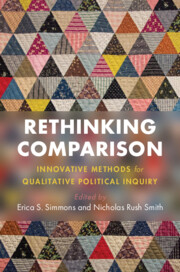Book contents
- Frontmatter
- Dedication
- Contents
- List of Figures
- List of Tables
- List of Contributors
- Acknowledgments
- 1 Rethinking Comparison: An Introduction
- Part I Rethinking the Building Blocks of Comparison
- 2 Beyond Mill: Why Cross-Case Qualitative Causal Inference Is Weak, and Why We Should Still Compare
- 3 Two Ways to Compare
- 4 Unbound Comparison
- 5 On Casing a Study versus Studying a Case
- 6 From Cases to Sites: Studying Global Processes in Comparative Politics
- Part II Developing New Approaches to Comparison through Research
- Theory and Imagination in Comparative Politics: An Interview with Lisa Wedeen
- Index
6 - From Cases to Sites: Studying Global Processes in Comparative Politics
from Part I - Rethinking the Building Blocks of Comparison
Published online by Cambridge University Press: 24 September 2021
- Frontmatter
- Dedication
- Contents
- List of Figures
- List of Tables
- List of Contributors
- Acknowledgments
- 1 Rethinking Comparison: An Introduction
- Part I Rethinking the Building Blocks of Comparison
- 2 Beyond Mill: Why Cross-Case Qualitative Causal Inference Is Weak, and Why We Should Still Compare
- 3 Two Ways to Compare
- 4 Unbound Comparison
- 5 On Casing a Study versus Studying a Case
- 6 From Cases to Sites: Studying Global Processes in Comparative Politics
- Part II Developing New Approaches to Comparison through Research
- Theory and Imagination in Comparative Politics: An Interview with Lisa Wedeen
- Index
Summary
In this chapter, I reconceptualize the twin concepts of “comparison” and “case,” by rethinking what political scientists often call a “single-case study.” I propose that much of the disciplinary ambivalence about so-called single-case studies is a product of a misconception regarding their nature, and that this methodological label is a misnomer for such studies. Drawing on my own research, I propose the term “site” rather than “case.” A site is a conjunctural intersection of various and heterogeneous processes, relations, and scales of political activity, some relatively enduring and some relatively ephemeral. The constitutive multiplicity of a site and the detailed empirical engagement it enables offer both inspiration and leverage for analytical claims. Conceptualizing the objects of our research as sites mitigates against the social scientific tendency to regard ongoing social processes in reified, monolithic, and static terms. In-depth empirical engagement with research sites draws our analytic attention to the social processes that provisionally result in spatial boundedness, enduring institutionalization, and individual and group identity formation – or, on the contrary, the events and processes that disrupt, modify, innovate, and transform them.
Keywords
- Type
- Chapter
- Information
- Rethinking ComparisonInnovative Methods for Qualitative Political Inquiry, pp. 107 - 126Publisher: Cambridge University PressPrint publication year: 2021
- 10
- Cited by

